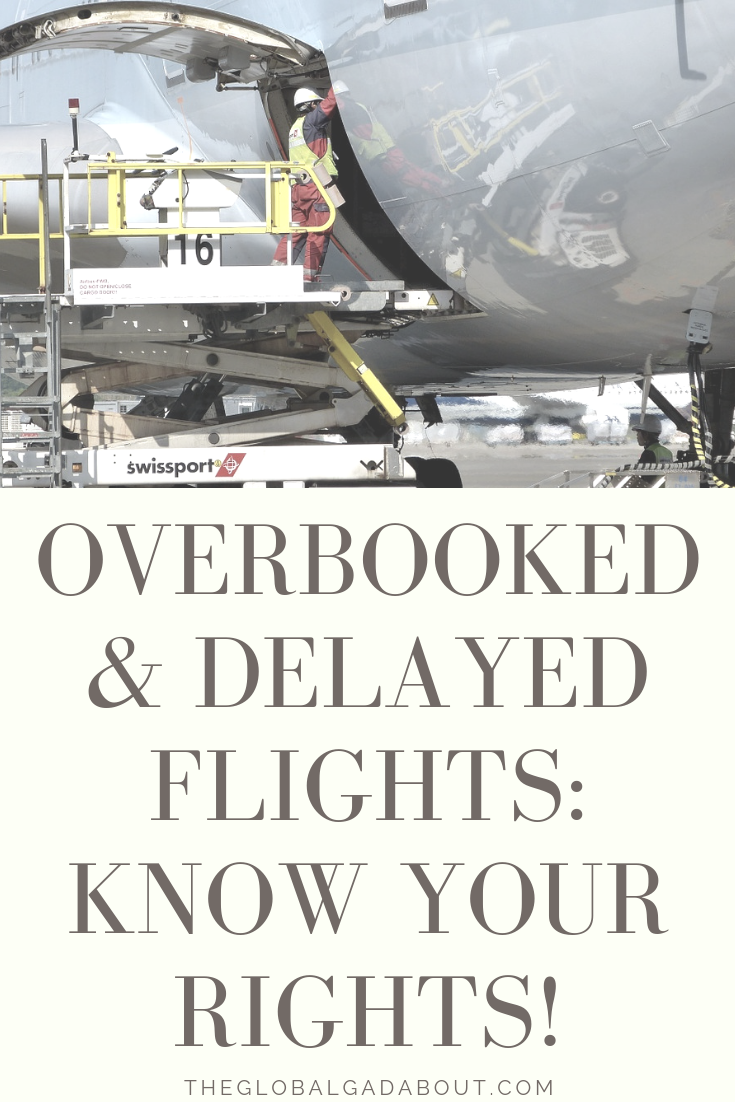
The rise of cheap flights around the world has certainly made traveling more affordable and accessible to adventurers of all budgets. It also seems like the number and frequency of air travel “horror stories” has also risen. Delays, cancellations, lost luggage, being bumped from a flight – these can all seriously negatively affect your trip. Hopefully, these things won’t happen to you. But if they do, what can you do about it? Knowing your rights and what airlines are legally bound to do to compensate you versus what they are not is the first step to getting what you deserve in the event of air travel trouble. This post will summarize air travel regulations in the US and Europe and tell you what is actual law versus what is common practice. Plus, some nifty infographics and flowcharts for the more visual among us 🙂

NOTE: The European regulations I list below generally apply to all of Europe, but technically some are specific to the European Union or to the European Economic Community. Belgium, Denmark, France, Germany, Greece, Ireland, Italy, Luxembourg, the Netherlands, Portugal, Spain, and (for now) the UK belong to both of these groups. The EEC laws apply to flights out of any airport in these countries and flights into these countries on airlines based out of an EEC country, Norway, or Switzerland. The EU regulations apply to those countries and the rest of their members: Austria, Bulgaria, Croatia, Cyprus, Czech Republic, Estonia, Finland, Hungary, Latvia, Lithuania, Malta, Poland, Romania, Slovakia, Slovenia, and Sweden.
Fares
US
LAW: Airlines have a right to change fares as often as they like. It’s up to you to book at the right time to get the best deal possible.
IN PRACTICE: If you book a flight, then later find a better price on the same exact, flight, some airlines will refund you the difference if you call and complain.
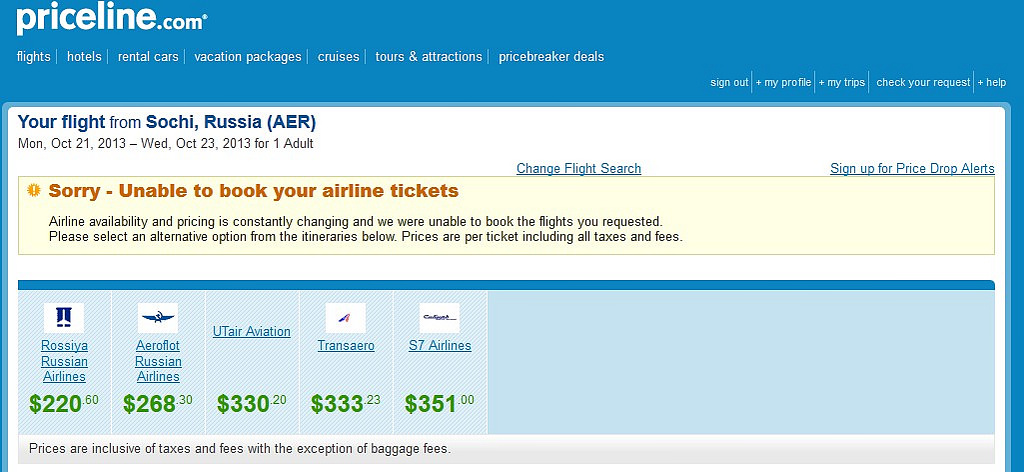
LAW: Airlines must prominently display any additional “extra” fees such as luggage, seat selection, and meals before and after booking.
LAW: When booking directly through the airline, you have the right to “reserve” or “save” an advertised price for 24 hours.
IN PRACTICE: In order to do this, you may have to actually call the airline and verbally place a hold on the price you are seeing.
IN PRACTICE: Most fares, especially discounted ones, are non-refundable. However, US airlines often do allow you 24 hours after booking to cancel at no charge. They will either wait 24 hours to charge your card or give you a full refund.
=> PRO TIP: You can use this as another way to “hold” a fare for 24 hours. Just don’t forget to cancel within the time frame if you decide not to keep the flight.
US and EUROPE
LAW: Airlines must display the full and complete cost, including taxes and fees, in advertising, online searches, and through any search partners or travel agents. What you see is what you pay.
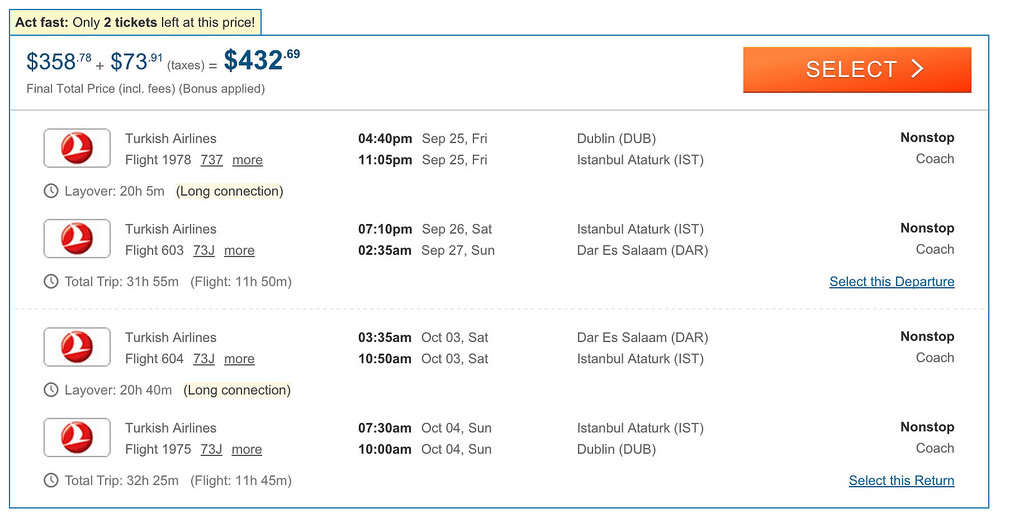
Overbooking
US and EUROPE
LAW: Airlines are perfectly within their rights to overbook their flights – ie. sell more tickets than they have seats.
IN PRACTICE: There are many no-show passengers on flights due to passenger changes, connective flight delays, etc. Thus, overbooked flights often end up having room for those extra passengers. But not always – see “bumping” below.
Bumping
US
IN PRACTICE: If a flight ends up with more passenger than seats, airlines will usually ask for volunteers to take a different flight in exchange for some sort of voucher, airline points/miles, or compensation.
=> PRO TIP: If you can be flexible with timing, volunteer to be bumped and get yourself some free travel with the offered voucher – these are often worth the price of the flight! If there are multiple flights on the same route on your day of travel, book an earlier one, knowing a later option is available and allowing you to volunteer to be bumped and not lose a day of travel.
LAW: Even if you are involuntarily bumped from a flight, if the airline can get you to your destination on any airline within one hour of your original arrival time, they do not owe you any compensation.
LAW: If the airline can get you to your destination within 1-2 hours of your original arrival time for domestic flights, or 1-4 hours for international flights, they owe you 200% of the one-way fare on your route, up to USD$675.
LAW: If the airline cannot get you to your destination within 2 hours of your original arrival time for domestic flights, and 4 hours for international flights, they owe you 400% of the one-way fare on your route, up to USD$1350.
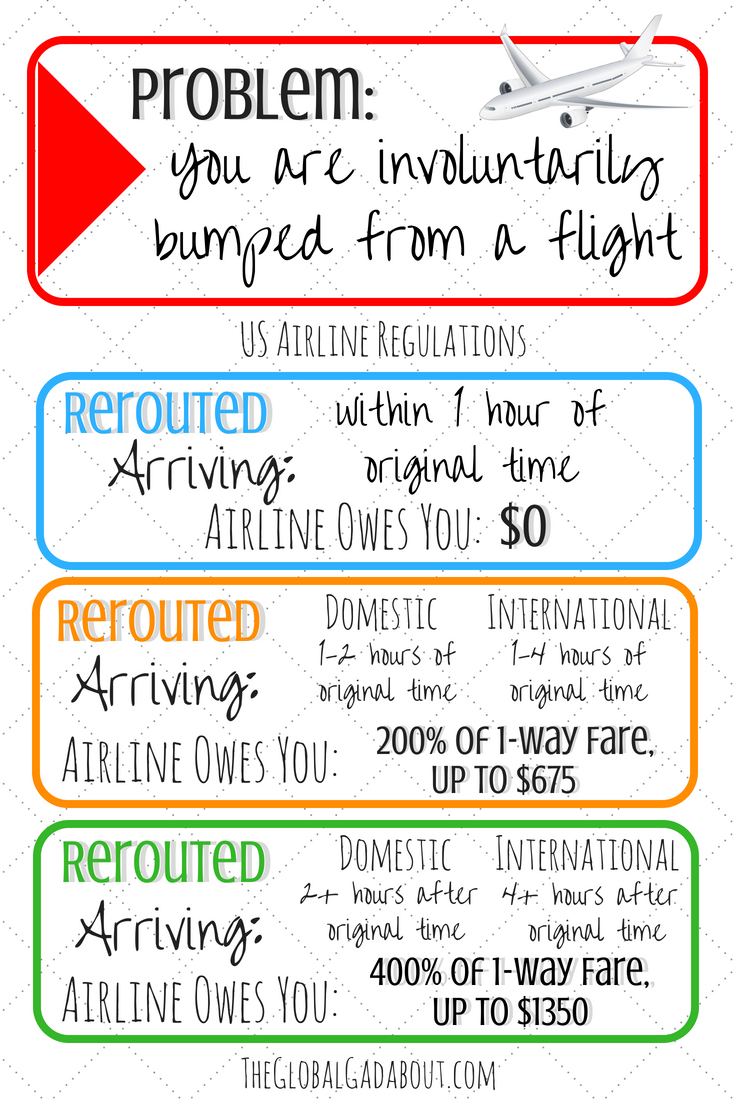
IN PRACTICE: Most airlines will probably try to give you vouchers or miles/points for future flights with them instead of cash. Take these if you prefer, by all means, but be aware that you are entitled to cash if you prefer.
LAW: The previously stated laws do not apply to planes less than 30 seats and to passengers bumped for any reason other than overbooking.
IN PRACTICE: Hardly any commercial planes are less than 30 seats, so that rule is mostly moot.
LAW: If you are involuntarily bumped from a flight, in addition to the compensation the airline owes, you have the right to keep your original ticket to use at another time or a refund of your purchase price.
LAW: If an airline re-routes you from an overbooked flight using a different airline, they are required to pay any fares and fees the second airline may charge. You are not required to pay for any of these.
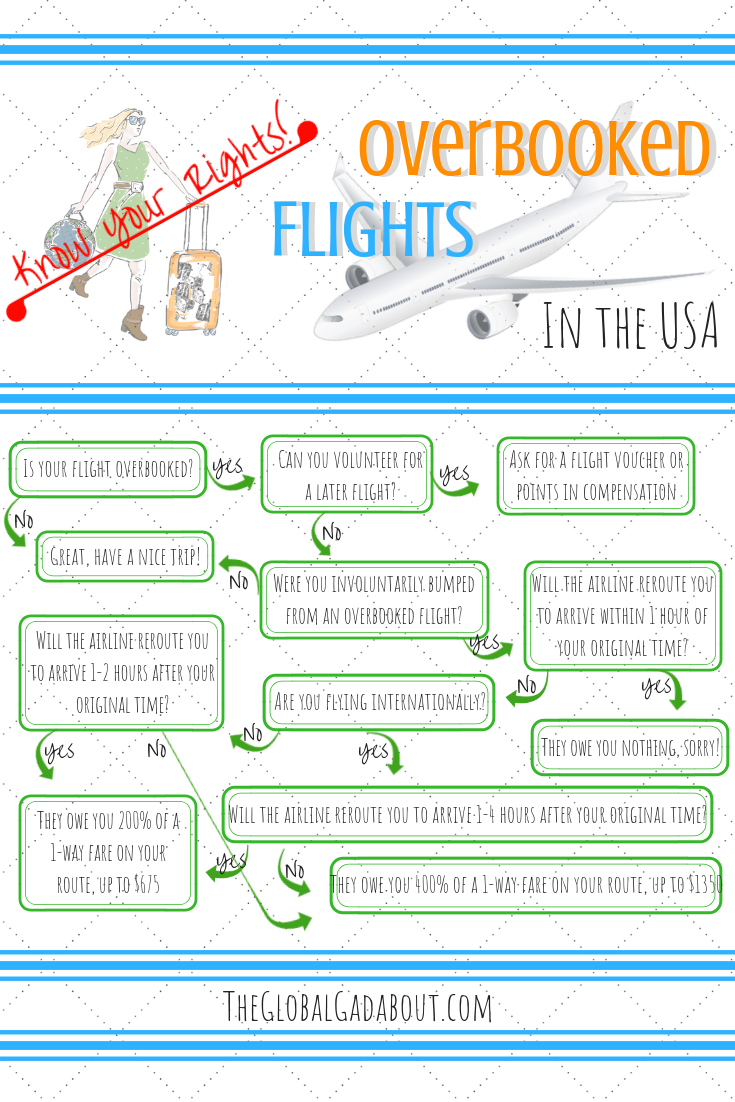
LAW: You must meet check-in deadlines and airline passenger requirements in order to qualify for refunds and compensation.
=> PRO TIP: When airlines must bump passenger, they usually choose those who paid the lowest fare or those who checked in last. Thus, you will be less likely to be involuntarily bumped if you arrive at the airport and check in for your flight early.
EUROPE
LAW: If you ask, airlines must offer to re-route you or provide a full refund.
LAW: If an airline cannot get you to your destination within 3 hours of your original arrival time, they owe you EUR250 on flights of 1500km or less, EUR400 on flights more than 1500km within the ECC, EUR400 on flights between 1500km and 3500km outside the ECC, and EUR600 on flights over 3500km outside the ECC.
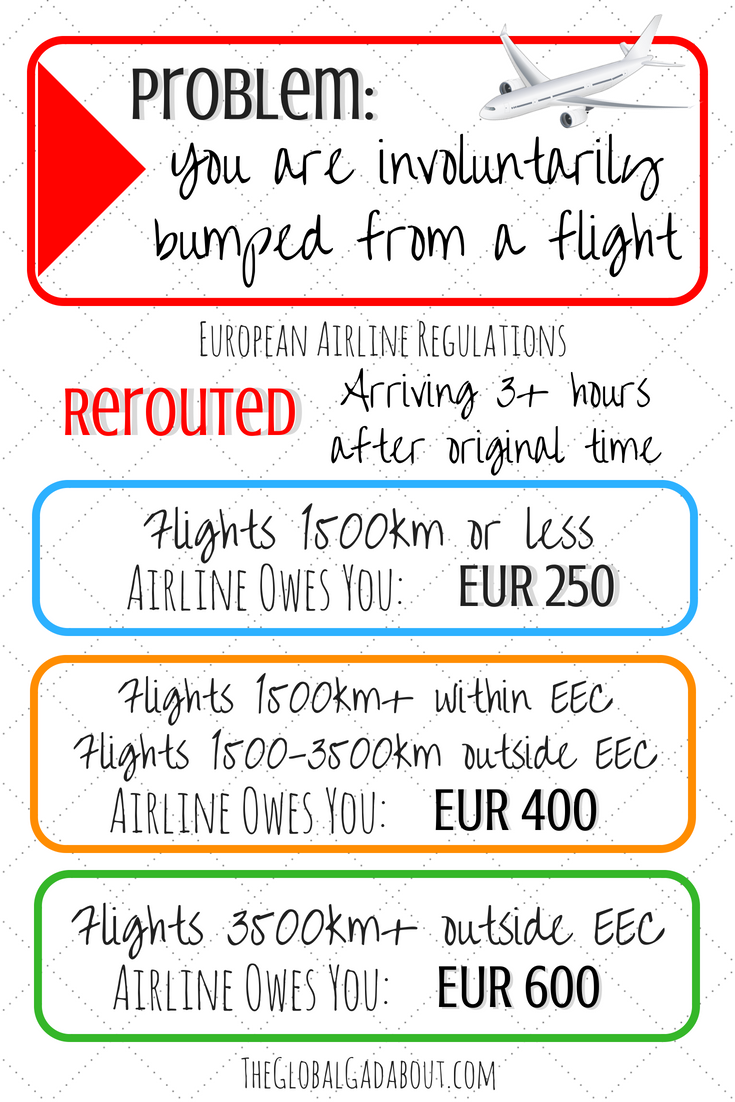
LAW: If bumped, airlines are required to offer you meals and refreshments in proportion to your wait time and hotel rooms and transportation if you a required to stay overnight.
LAW: The previously stated laws apply to passengers bumped for any reason, not just overbooking.
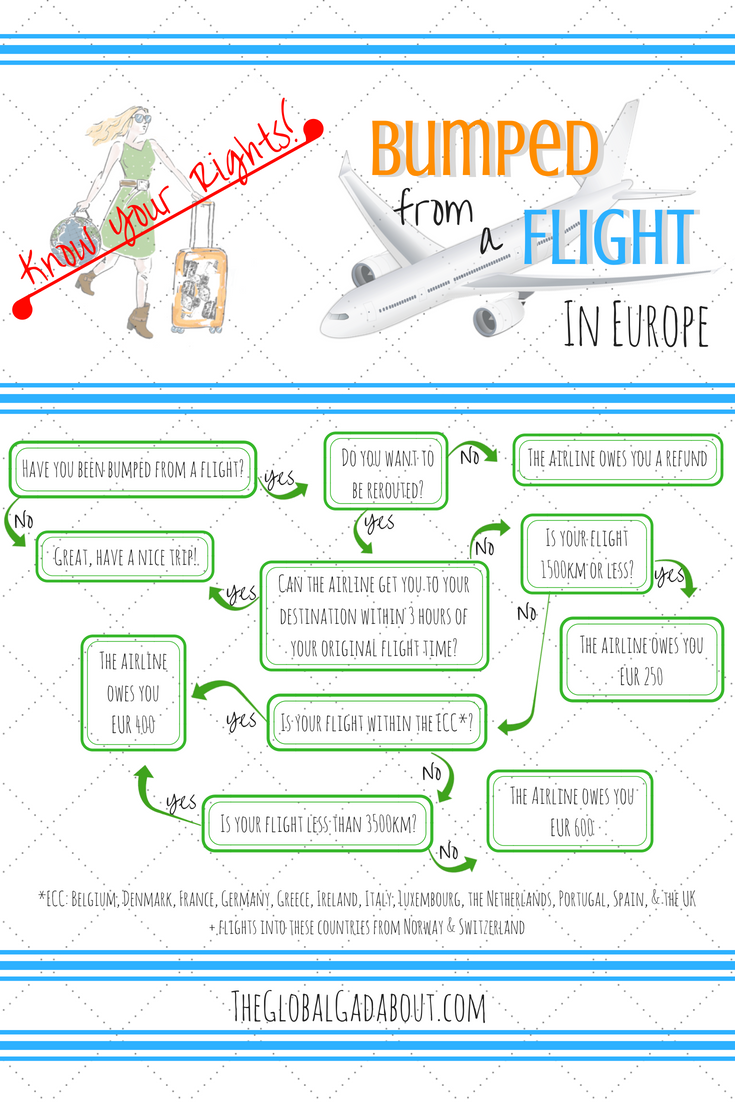
Delays & Cancellations
US
LAW: If your flight is canceled, rescheduled, or substantially delayed, you have the right to be rerouted at no cost or to receive a full refund.
IN PRACTICE: The definition of a “substantial delay” is not federally defined, and thus varies by airline. Airlines are required to state their practices in a Customer Service Plan or Contract of Carriage.
IN PRACTICE: Most airlines will offer meal vouchers if you are delayed over a meal time and hotel vouchers if you are delayed overnight.
IN PRACTICE: Some airlines say they will transfer you to another airline in the event of a delay, some airlines say they may transfer you, and some airlines will only offer you a seat on one of their own flights.
LAW: Specific compensation for delays and cancellations is not required.

LAW: If you are delayed on the tarmac upon arrival or departure, airlines are required to let you get off if you want (and security permits) after 3 hours for domestic flights and 4 hours for international flights.
LAW: Airlines are required to provide food and water after 2 hours of a tarmac delay.
LAW: Airplane toilets are required to be available and operational during tarmac delays.
LAW: Airlines must provide updates every 30 minutes of a tarmac delay.
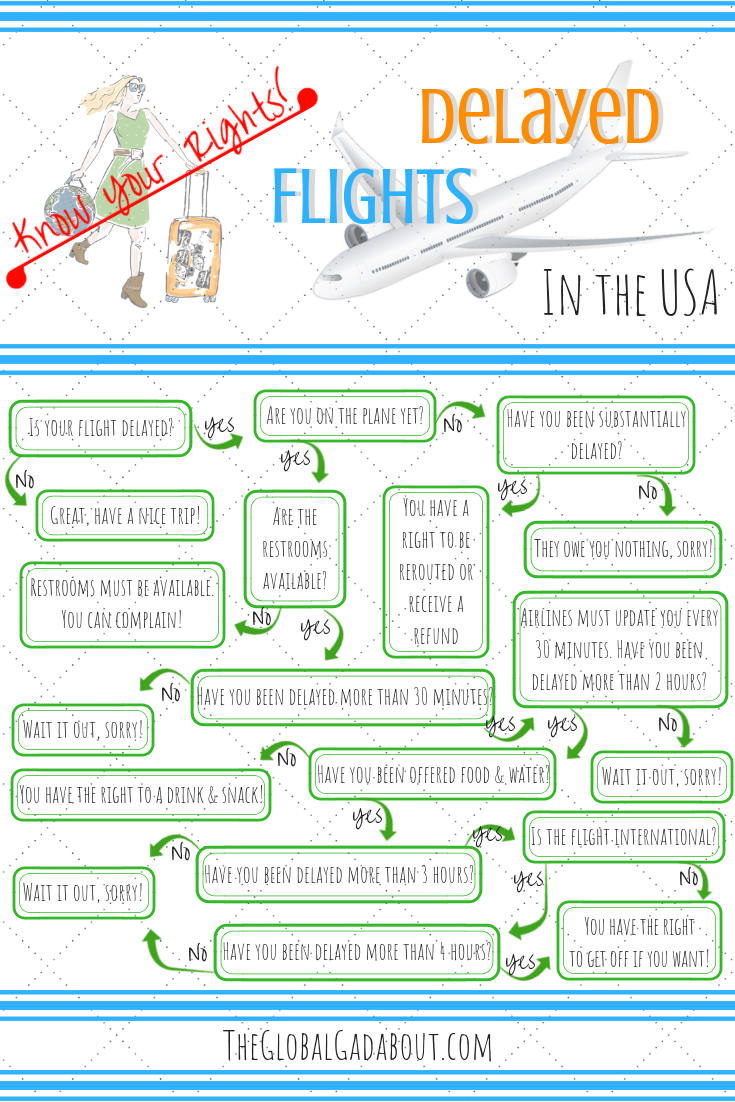
EUROPE
LAW: If your flight is canceled, airlines owe you the same monetary compensation, vouchers, and rerouting or refunding options they must offer to bumped passengers – see “bumping” above.
LAW: If your flight is delayed more than 3 hours, at the gate or on the tarmac, the airline also owes you the same monetary compensation outlined previously. A more than 5-hour delay entitles you to a full refund.
LAW: The airline does not owe you the above compensations if they notify you of the canceled flight more than 14 days in advance, or if they notify you between 7 and 14 days in advance and reroute you to arrive within 4 hours of your original time, or if you are given less than a week’s notification but are rerouted to arrive within 2 hours of your original time.
Lost/Delayed Luggage
US
LAW: Airlines must refund any baggage fees if the bag is lost.
LAW: Airlines are required to compensate “reasonable expenses” for loss, damage or delay of your luggage. Depending on the length of the delay and the value of the contents of your bags, “reasonable expenses” could be up to USD$3500 for domestic flights and USD$1675 for international flights.
IN PRACTICE: Airlines will want to compensate you as little as possible and may require receipts or other proof of value, especially for expensive items. Expect the process to take a while.
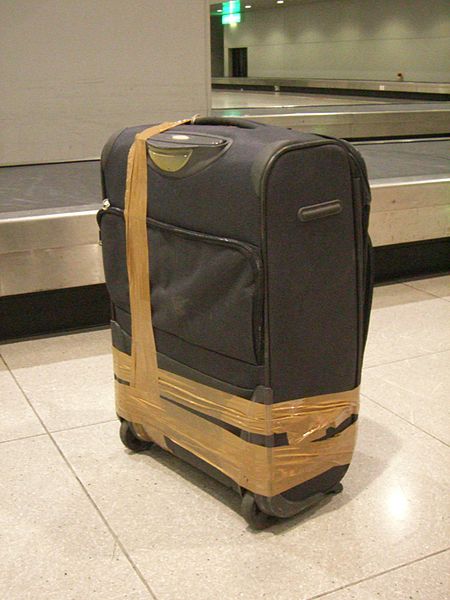
EUROPE
LAW: Airlines are liable for approximately EUR1200 for damaged, delayed, or lost luggage, depending on the value of the contents. You must file a complaint with 21 days to be eligible.
This point by point summary should make air transportation laws for the US and Europe more clear, and define what you are and are not entitled to in the event one of these air travel problems happens to you. For more information and the full legal-eze, check out the US Department of Transportation’s Fly Rights or have a peek at the 2017 bill introduced to Congress regarding airline passenger rights.
European Union air travel rights can be found in full on the EU website Europa. Click here for air passenger rights, and here for carrier liability for passengers and baggage. Hopefully, you will never experience any of these problems, but if you do, now you know your rights!
*This post includes one or more affiliate links. I earn a small commission (at no extra cost to you!) if you purchase a product or service through one of these links. Find out more here.*
Related Posts:
- 5 Tricks for Getting the Cheapest Flight
- 5 Ways to Avoid Paying Baggage Fees
- How to Make the Most of Awkward Travel Patterns
Want more from The Global Gadabout? Sign up for the newsletter and like the Facebook page!
Pin this post for later!

